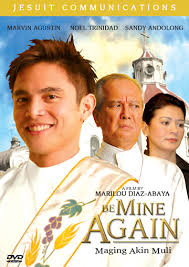
BE MINE AGAIN/ MAGING AKINI MULI
Philippines, 2005, 90 minutes, Colour.
Marvin Agustin, Noel Trinidad.
Directed by Marylou Diaz Abeya.
Popular devotion as well as parish pastoral outreach is found in Be Mine Again a film made by Jesuit Communications in the Philippines. It is the story of a young boy, Jun Jun, who enters the seminary, is ordained deacon and goes on pastoral placement in his home town, preferring to work with the poor and needy (Marvin Agustin). The parish priest is 65 (Noel Trinidad), scholarly and traditionalist quoting Latin.
Jun Jun makes a number of mistakes, his former girlfriend using her mobile phone in church, his encouraging a rock band for the liturgy, visiting a man condemned to execution in jail and writing a letter to the paper against capital punishment, pausing at the wrong time in a marriage ceremony…
The crisis comes with the former girlfriend becoming pregnant, confiding in Jun Jun, her parents angry assuming that he was the father and bashing him, the parish priest becoming more sympathetic, Jun Jun speaking from the pulpit about himself, making mistakes, having to learn, his director from the seminary in the congregation, and they all applaud. His mother is initially reluctant about his going to the priesthood, not having grandchildren but having seminarians as sons.
A way of raising contemporary vocation issues through a feature film – in the Philippine culture.
1. A film by the Jesuits? Filipino culture? Religious tradition?
2. The work of the director, her prominence in the Philippine film industry?
3. The film as a vocation’s film, encouraging vocations, raising questions and issues, offering hope?
4. Introduction, Jun Jun, as a child, growing up, going to the seminary, with his mother, her hesitations, his being ordained deacon?
5. His appointment, Father Doy, mid-60s, old-style, quoting Latin, threatening to send his deacon back to the seminary with strikes against him? The way of life in the presbytery, meals, the parish priest and his garden?
6. The formalities of the church, the ordination ceremony, clerical garb? Vestments at mass? Yet the easy-going and informal dress of the parish priest, singlets and shorts for the deacon?
7. The episode in the church, Dolly and her mobile, the deacon checking his, the parish priest on his mobile?
8. The issue of the band, the practice, performance, the older members of the congregation and their disapproval? The parish priests impatience? The council meeting, the discussions, the vote? Allowing one guitar but no drums?
9. The deacon and the celebration of the wedding, the father and his being a councillor, the pause and the parish priest’s disapproval?
10. Father Doy, his age, liking sweets, his fall, in bed, being cared for? Jun Jun and his help?
11. Dolly, pregnant, confiding in Jun Jun? The issue of termination? Her parents, their upset, accusing Jun Jun, fighting with him? The later apology?
12. The man in prison, to be executed, the murder of his boss? His fears? The news of his execution? Jun Jun and is writing a letter against capital punishment? Father Doy’s disapproval?
13. Jun Jun in the pulpit, his acknowledging his faults, asking for help? His discussions with Father Paul? Father Paul in the congregation? The tears, the women? The applause?
14. His future as a priest, explaining this to Dolly? To his mother, his asking her about not having grandchildren and her replying that she would have seminarians? And his reply that his parishioners would be his family?
15. How effective are vocations film – in the Philippines? Beyond?